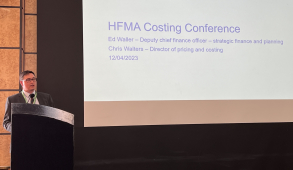Approved costing guidance faces further delay
This year’s costing submission has been hit with problems connected to staffing difficulties with a shortage of data engineers in particular – in part driven by the merger of NHS Digital with NHS England. Earlier in the year NHS England said this required a ‘re-engineering of the collection process’. However, it also confirmed at the time that the NCC would go ahead with a collection at the patient-level, although the collection window would not open until at least 18 September.
A costing newsletter this week confirmed that the collection was still ‘scheduled to begin in September’. This would be two months later than last year’s collection which started in mid-July. But the guarantee of no submission until September was helpful to enable costing teams to plan their workload over the summer.
However, NHS England apologised this week for the delay in publishing the costing guidance, which it acknowledged many people were expecting by now. Last year’s guidance was published in March and there have been calls to improve the timeliness of the whole costing process in general.
NHS England had indicated at a webinar earlier in the year that it intended to publish the guidance and associated documentation by 10 May. According to the email bulletin, the guidance was ‘currently working its way through the NHS England governance process.
The guidance will confirm any changes to the costing methodology. Although there are not expected to be fundamental changes to the process overall, planned changes to bring the costing transformation programme to a close will go ahead. This will involve the decommissioning of the old cost collection workbook, which enabled the submission of some costs at aggregate level and required a separate platform for collection.
From this year, chemotherapy, palliative medicine, radiotherapy, community maternity and renal services will be brought into the patient-level production. Costing practitioners have also been able to draw on last year’s early implementation collection guidance for an insight into this year’s formal requirements.
However, practitioners are keen to see final confirmation of guidance ahead of starting this year’s collection. And more details on the actual submission timetable would also be helpful for planning purposes. The newsletter said that preparatory information ahead of this year’s NCC will be sent out in emails over a four-week period starting from the end of May. This will include follow-ups on any outstanding action plans, issues arising from finance director sign-offs and other points raised in reviews of submitted data.
NHS England has also announced that it will shortly be starting the next phase of its ‘understanding local PLICS’ project. This will include sessions with costing practitioners to get their views on the future of costing. Those interested in getting involved can contact the costing team via the costing inbox.
NHS England representatives told the HFMA annual costing conference recently that work so far had identified four key differences between national and local patient-level costs. These included the services that were included or excluded from the various collections and the approach to unbundling. There were also differences in the degree of cost pooling – for example whether staff costs per patient were collected at the whole ward level or disaggregated by staff group. Finally, there were differences in how patient-level costs were linked to currencies.
The ’consistency and predictability’ of these differences opened up the possibility of developing an automated solution for mapping local patient-level costs to a nationally required format – reducing the burden on costing practitioners in submitting data.
Following testing of the mapping algorithm, which will begin this year, there could be a rapid roll-out of the system. ‘The idea effectively is that we can take data out of local systems without manual input in a real-time, user friendly way and give people back data on a similar basis,’ Ed Waller (pictured), NHS England’s deputy chief finance officer, told the event. A shadow process could be run alongside next year’s national cost collection, with the collection potentially fully automated from 2025.
Related content
The Institute’s annual costing conference provides the NHS with the latest developments and guidance in NHS costing.
The value masterclass shares examples of organisations and systems that have pursued a value-driven approach and the results they have achieved.